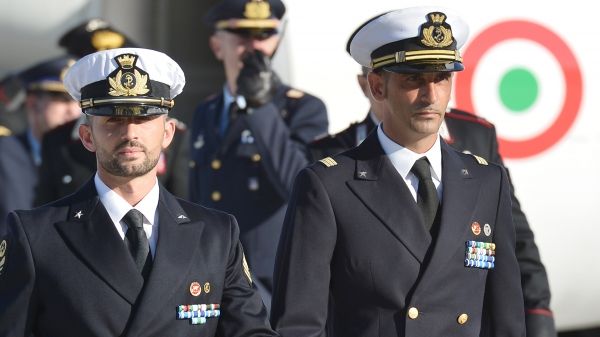James Walston follows the complicated story of the two Italian marines accused of killing two Indian fishermen, the worsening diplomatic relations between Italy and India and the resignation of Italy's minister of foreign affairs.
Yesterday, the Minister for Foreign Affairs, Giulio Terzi went to Parliament to explain the government’s position. Instead he resigned in front of the Chamber to the surprise and consternation of Admiral Di Paola, the Minister of Defence who was sitting next to him and Prime Minister Mario Monti who was not present. He had told neither of them but spoke of divisions in the Cabinet which he was unable to deal with.
Further evidence of confusion at the top levels of Italian government as well as on the water and in Kerala 13 months ago.
As every English schoolkid knows
Oh, The grand old Duke of York, He had ten thousand men;
He marched them up to the top of the hill, And he marched them down again.
And when they were up, they were up, And when they were down, they were down, And when they were only half-way up, They were neither up nor down.
The Defence Minister, Admiral Giampaolo Di Paolo has only two marines but they have been back and forth between Bari and Kochi in Kerala and Rome and New Delhi with as much uncertainty as the Duke of York’s men.
The two men are accused of the illegal killing of two Indian fishermen in February last year and have been the subject of very complicated wrangle ever since involving international law, national politics, diplomacy, corruption and multi-million euro deals.
After having told the Indian government very publicly on 11 March that Italy would renege on the deal by which the two men had been given a month’s parole, the Italian Minister of Foreign Affairs, Giulio Terzi decided yesterday to send them back to India to face trial.
From the beginning, the whole episode has been a chain of mistakes and misjudgments which have not enhanced Italy’s reputation as a world player.
On 15 February last year, two fishermen were killed by shots fired from the MV Lexie, a tanker flying the Italian flag with six Italian marines on board as defence against possible pirate attacks. The marines mistook the fishing boat for pirates. Two of them Massimiliano Latorre and Salvatore Girone were identified as being responsible for the killing.
Even after 13 months there is still some doubt as to exactly what happened and where the vessel was when the incident took place as no immediate report was made. The Indian coast guard brought the ship into Kochi and there are conflicting reports as to whether it was an “invitation” or an obligation. There is also confusion as to how the two marines were actually apprehended. They have said to journalists that they were tricked into leaving the ship. It is also possible that the Lexie was outside Indian territorial waters and outside the contiguous zone where India has a right to intervene.
If the ship was in international waters and the Indians forced it into Kochi and forced the marines to leave the ship then it was almost certainly an illegal act but no Italian protest was lodged at the time nor since then.
Once on Indian soil, clearly the federal and Kerala state authorities had the right to investigate an incident whose victims were Indian but the final jurisdiction of the case is far from clear.
Trying to maintain good relations with Italy, the Indian courts granted Latorre and Girone house arrest and then gave them parole for a Christmas visit. This allowed both Kerala and national opposition to accuse the government of favoritism due to Sonia Gandhi’s Italian origins so the case became part of the domestic political game.
The two men were granted a second parole for a month to cover the Italian elections with the Italian ambassador standing surety for them. When Terzi said that they would not be returning, in effect jumping bail, the ambassador found himself in practice a hostage, prevented from leaving the country, his diplomatic immunity unilaterally removed. This is contrary to all the diplomatic conventions but then the modern world has not seen diplomats offer themselves as bail guarantors.
The decision not to send the two men back was seen by just about everyone here has a mistake which made Italy look very bad internationally, unreliable and two-faced.
It certainly has not helped the issue that the two men have been feted as heroes – met at Ciampino airport by the defence and foreign ministers and then received by President Napolitano.
Although there has been no statement from the High Representative of the European Union for Foreign Affairs & Security Policy Catherine Ashton, (apart from her spokesman putting out an anodyne hope that Italy and India resolve their differences) one can guess that she was in despair at both the Italian and Indian actions and put some discreet pressure on Terzi and Monti to keep their word.
And given the other area of tension between Italy and India where Agusta is accused of paying bribes in a helicopter deal with the Indian air force, Italy certainly did not want to risk the lucrative deal with a serious diplomatic row.
James Walston is Chair of the Department International Relations and Global Politics at the American University of Rome.
Posted 15.05 22 March 2013





















